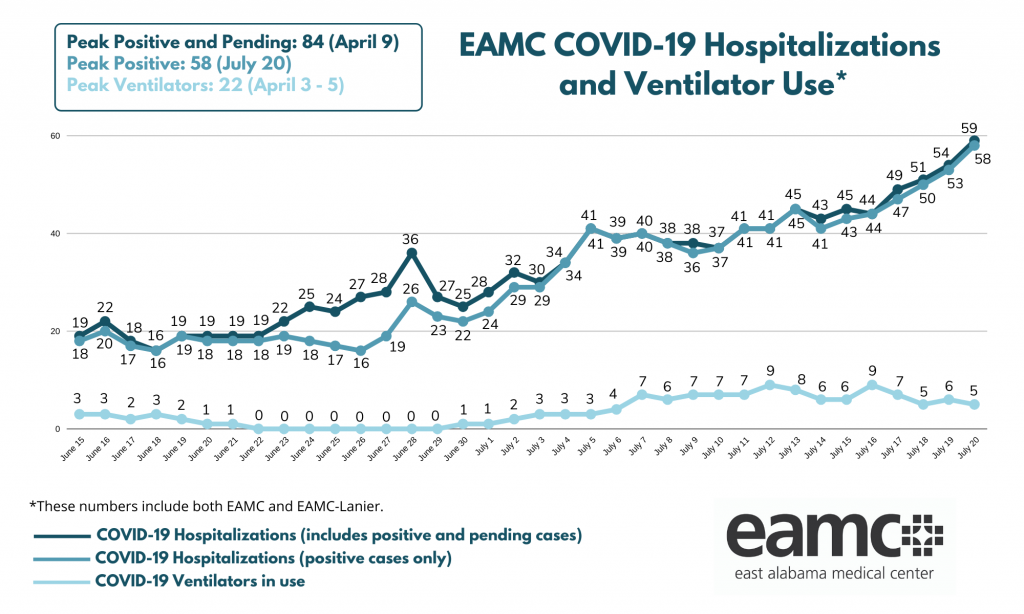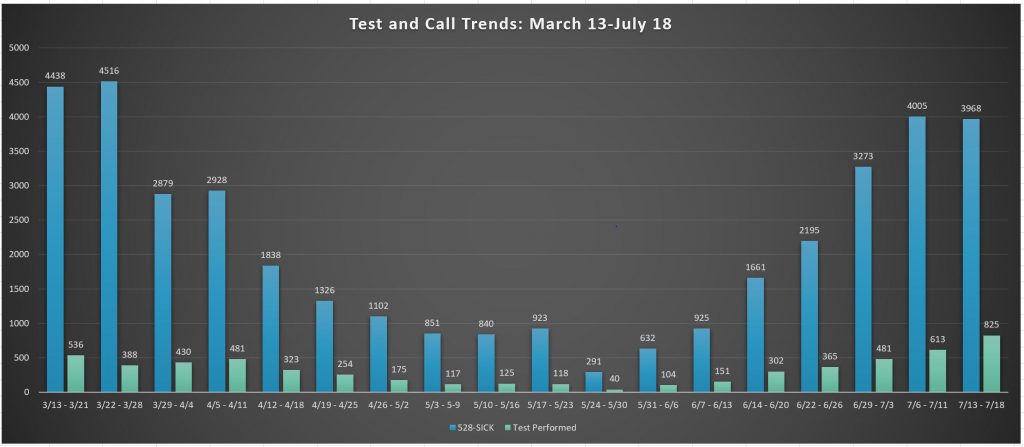Courtesy EAMC
After having 54 hospitalized patients with confirmed cases of COVID-19 on April 11, and then beginning a descent, EAMC officials hoped the worst was behind them. Turns out, the worst may still be ahead of them. “I expect we will have yet a higher peak in the next week,” stated Ricardo Maldonado, M.D., EAMC’s infectious diseases specialist, this morning. “And it’s too early to tell what will happen in the coming weeks and months. Hopefully, the mask mandate currently in place will go a long way in lowering our numbers and keeping them low.”
Maldonado went on to talk about other concerns. “We are seeing younger patients lately who are very sick. We have had patients in their 30s die from COVID-19, and 3 of our 12 deaths this month have been under the age of 50,” he said. “Some people have a hard time taking this seriously because they have only seen mild or asymptomatic cases among family and friends. What we have seen in the hospital is that you can take two people with the same age and comparable health, and one will barely have any COVID-19 symptoms and the other will die from it.”
Regarding masks, Maldonado would like to see everyone on the same page. “I’ve seen some younger people in public with no masks. They are likely not afraid of COVID-19 making them sick, yet they need to understand that they could pass it on to someone who could become very ill or die from it.” Maldonado concluded, “This is not about individual freedoms; this is about a community dealing with a health crisis we have not seen in modern history. In a public health crisis like this, it’s important to think of the greater good. That’s how other countries have been successful in fighting COVID-19.”
Michael Roberts, M.D., a hospitalist and EAMC’s current chief of staff, addressed the demographics of COVID-19 in our community. “I have heard the sentiment that most of the COVID-19 deaths are in patients who are at the end of their lives anyway,” Roberts stated. “We believe that the lives of all of our patients are valuable, and we do the very best we can for every patient.” He then compared the original peak to where we are today. “In the first peak, we did see a greater number of patients from nursing facilities. One thing that is different about this peak is that we are seeing many patients who are still in very active, productive times in their lives. This virus is robbing them of many years. We have an opportunity to save lives as a community by practicing social distancing, avoiding large gatherings, and wearing a mask. We can do better, and collectively we can make a difference.”
With 58 confirmed cases in the hospital today, EAMC President and CEO Laura Grill says the pandemic is again pushing staff and physicians to the limit. “We have four units designated for patients with COVID-19 right now and may very well have to open others in the coming days. Last Friday, I visited our ICU for a little while. It was tough seeing how emotionally draining this is on our staff. They are used to caring for critically ill or injured patients, so that does not faze them. However, fighting a complex virus like COVID-19 every day and losing patients to it is very taxing on them as well as our staff members in other units.”
TESTING RESULTS FOR LAST WEEK
At EAMC’s drive-through testing site last week, 825 people were tested and 142 were confirmed as positive. That is a positivity rate of 17.2 percent. At the Auburn University Medical Clinic, 933 people were tested and 83 tests came back as positive for a rate of 8.9 percent.
BLOOD PLASMA CLARIFICATION
There has been some confusion about donating blood to be tested for COVID-19 antibodies and then having to wait 56 days to donate plasma if the person does have COVID-19 antibodies. EAMC spoke to a LifeSouth Blood Center representative to help get a clearer picture of the process for those interested in donating plasma.
For those who do not test positive for COVID-19 or are unsure if they had COVID-19 in the past, LifeSouth suggests donating whole blood to get an antibody result. If a person is found to have COVID-19 antibodies during the whole blood donation, they can donate plasma only seven days later. The 56-day interval that has caused confusion is an interval for the time that must elapse between whole blood donations, not between a whole blood donation and a plasma donation.
For those who have had a positive antibody test or a positive COVID-19 test, the whole blood donation can be bypassed, and that person can be scheduled for a plasma donation. However, a positive COVID-19 test does not mean you will definitely produce antibodies. There have been a few patients who tested positive for COVID-19, but then had a negative antibody test. People who donate plasma can be assured, however, that the plasma will be used regardless of whether COVID-19 antibodies are present.
Lastly, donors must be symptom-free for 14 days and fully recovered from COVID-19 prior to donating plasma or whole blood. Appointments are required for plasma donation due to the limited number of instruments on hand to complete this procedure. While walk-ins for whole blood donations are allowed, LifeSouth recommends that an appointment be made. Appointments can be made online at lifesouth.org or by calling LifeSouth at 334-705-0884.


